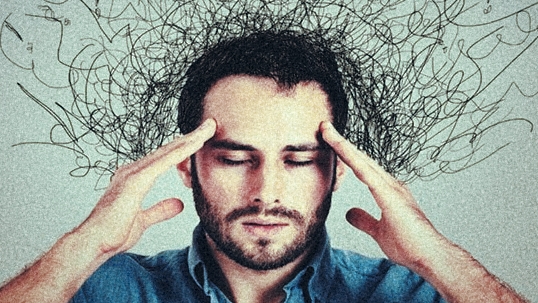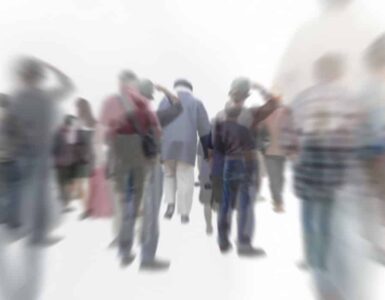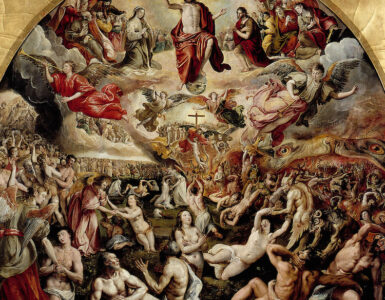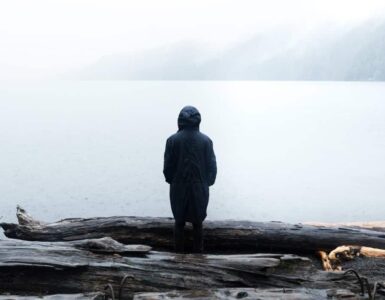Worried about the future? Over eat or under eat? Irritable at times? Get headaches or belly aches? Avoid or sit out of social activities? Can’t focus? Well, this was another one of my favorite lectures in psychology class. Why so? Seems college students today have a lot of anxiety. And though some anxiety may be good for you, spurring on growth, for the most part it may cause a myriad of symptoms and consequent health issues. They are glued to their desks when I talk about it. It’s that inner discomfort or nervousness we all experience from our precarious world, our rushed life. It might manifest itself through problems with friends and family, financial concerns, speaking before others especially formally in a group. As Lucy in Charlie Brown comics once said, “though we might want it so, life is not a spiritual jet stream.”
We can analyze anxiety through its classic bio/psycho/social components; that is, biological, psychological and sociological factors. Some are prone to anxiety because of certain amounts of chemicals in the body [biological]. Popular psychologist Jordan Peterson points out that when lobsters win their battles at the bottom of the ocean, their bodies secrete more serotonin and experience a general state of comfort and well-being. They start to prance and dance around the ocean floor. Same is true with humans. Coping and success in life is a natural sedative and yet euphoric experience.
Genetic dispositions can contribute to anxiety, and family medical history are known to be indicators of the same. Minor illnesses might result such as dizziness, high blood pressure, digestive disorders, muscle tension and fatigue. Of course prolonged anxiety can lead to much worse.
Psychological experiences from childhood, learned fears, past traumatic experiences can trigger it [war, child abuse]. One may be more prone to anxiety through pessimistic thinking and other cognitive components such as worry, fear, loss of control, paranoia and panic, irritability and restlessness. Individuals respond in one of three ways – flee from a situation, freeze up, or overly aggressive behavior. Through family conflict for example, an individual might run away or hide in a room, be passive and say nothing, or lash out with anger. But it takes prayer and lots of it. For us Catholics we can take heart in Philippians 4:6 calling us not to be anxious about anything, for by praying and thanksgiving, and letting our requests known to God, relief is available.
Culture and socialization can affect the anxiety prone. Gender differences in social situations may bring on anxious feelings through perception. Some situations may bring up survival instincts. Do I belong, do I fit in, why so uncomfortable? Women are more open about it while men are less likely to acknowledge or report anxiety. Our modern bureaucratic, technological society engenders anxiety through its tendency toward control. It is that anti human experience that will bring it on. The dilemma of the day; that is, the unhumanistic authoritarian impulse brought on by both ideology and the bureaucratic/ technological state. Romans 8:15 reminds us that we did not receive the spirit of slavery to fall back into fear, but rather the Spirit of adoption as sons of the Father, by whom we cry, “Abba! Father!” Again, bureaucracy, technocracy and authoritarianism engenders the opposite.
Finally, humanistic and positive psychology, originated by popular psychologists Carl Rogers and Abraham Maslow, proposes that our own egos and anxiety are intertwined. Referred to as transactional analysis, an individual leads an existence of carrying around three egos or selves within: ideal, real and perceived self, that ever evolving self concept. An imbalanced self concept would then lead to social anxiety disorder. So that when two people meet, it is then three egos each or six individuals interacting. LoL. “Who am I, who are you?” they say subconsciously.
Former rock stars and celebrities Jimi Hendrix and Janis Joplin were their ideal selves on stage. It became for them too difficult to deal with every day coping responsibilities and reconcile the two selves. It lead to a faulty perception of who they really were and further to an intolerable anxiety – incongruent selves. Drugs was the answer, death was the result.
Popular author, TV and radio evangelist, Joyce Meyer maintains in many of her books and sermons that we must learn to handle fear, worry and anxiety in a Godly way. We start by saying “I trust God.” It releases His power to work in our lives. When troubled by anxiety, she calls us to study God’s Word and remember what He has done for us before. Then remove the words fear and worry from you vocabulary. Remember that when seeking the Lord, He answers and delivers. So, though not intended at the onset of this article, this author would be remiss if he did not mentions some self treatment steps when in the midst of or even before any onset of anxious feelings.
(1) Maintain a positive attitude through prayer and meditation;
(2) Sleep well, 8 hours at least;
(3) Exercise, walk, swim, stretch, participate in golf, pickle ball, or other social sport;
(4) Get away from salt, sugar, caffeine, alcohol, nicotine;
(5) Eat more fruits and vegetables, avoid the junk food;
(6) Know what it is that brings on your personal anxiety;
(7) Discuss with a confidant, husband, wife , friend.
(8) Repeat number 1 on this list.
Proverbs 3: 5-6 “Trust in the Lord with all your heart and lean not on your own understanding; in all your ways submit to him, and he will make your paths straight.”
And peaceful I might add.
+++
Adapted from: Baglino, Michael J. The Dr. B. Reader on the Ologies: Psychology, Sociology, Anthropology. New York: Amazon Professional Publishers, 2023.






























